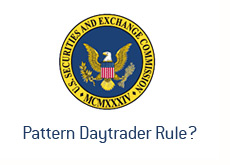Should The Pattern Daytrader Rule Be Repealed?
 In 2001, the SEC approved amendments to Rule 431 at the NYSE and Rule 2520 at the Nasdaq.
In 2001, the SEC approved amendments to Rule 431 at the NYSE and Rule 2520 at the Nasdaq.These amendments introduced the "Pattern Daytrader Rule", which is still in effect today.
What is the "pattern daytrader rule"?
This rule basically prohibits any trader with less than $25,000 of equity in their brokerage account from making more than 3 round-trip "day trades" per week (5 business days).
The rule is a bit more complicated than this, but this is the basic gist of the "Pattern Daytrader Rule".
So let's say that you have an account at Interactive Brokers.
You have worked two jobs in order to build up some equity so that you can try your hand at trading the markets, and have been able to scrape together $10,000.
You buy 100 shares of MSFT at $18.50 on Monday, and sell just a few hours later for a profit of $150.
You buy 100 shares of MSFT at $19.00 on Tuesday, and sell just a few hours later for a profit of $150.
You buy some more MSFT on Wednesday, and bank yet another profit of $150 in just a few hours.
Success! You have made $450 in just three days.
Here's the problem - you log into your account on Thursday, and find that you are unable to execute any new buys. You are only able to close existing positions. What gives?
In order to prevent your account from being frozen for 90 days (as the NYSE regulations stipulate if a qualifying investor attempts to execute his 4th round-trip "day trade" in less than five business days), Interactive Brokers (and many other brokers) will automatically prevent you from entering into any new positions until the "5 business day" period is up.
To recap:
1. You saved $10,000 of your OWN money (that you paid taxes on) and opened an online brokerage account.
2. You made money on all three of your trades.
3. You are prohibited from trading until the current 5 business day period is up (starting from the day that you made your first round-trip day trade).
Many people aren't aware of this ridiculous rule.
The hilarious thing is that the NYSE and NASDAQ implemented this rule to "protect smaller investors" in the wake of the Internet bubble popping in the early 2000s.
Actually, let me rephrase that - they wanted for the opportune moment, when most investors and traders were thoroughly disgusted with the markets in general, to slip in the rule change with minimal resistance from the public.
I believe that this rule hurts people for the following reasons:
1. It seeks to encourage people to place their money with money managers and full-service brokerages. We all know how catastrophically bad the average investor has done over the past few years by trusting the "expertise" of stock brokers.
2. It seeks to discourage people from taking an active interest in investing their own money (I emphasize - the money in my trading account is MY money .. why are they telling me how I should invest it? I thought that it was the land of the free..)
3. It encourages people to hold positions overnight (which can be very risky).
4. It is an intrusive and meddlesome rule.
5. It may encourage some people to open forex and futures accounts that don't have these restrictions.
Who is this rule really for?
Was it really intended to protect the smaller investor?
Or was it instituted to help stem the tide of money that was flowing out of full-service brokers and into discount brokerages such as E-trade and Ameritrade?
Can we start allowing small traders and investors to make their own decisions without interfering in their affairs?
Why should the SEC, NASD and NYSE have any say in how I trade my money? I'm not breaking any laws - rather, I'm simply participating in the markets.
Is executing 4 round-trip day trades per week potentially more harmful to my financial well-being than placing my money with a full-service broker who probably knows less about the markets than I do?
It's time to empower smaller investors and traders, and not limit them.
It's time to repeal the Pattern Daytrader Rule, much to the chagrin of most on Wall Street.
Filed under: General Knowledge



